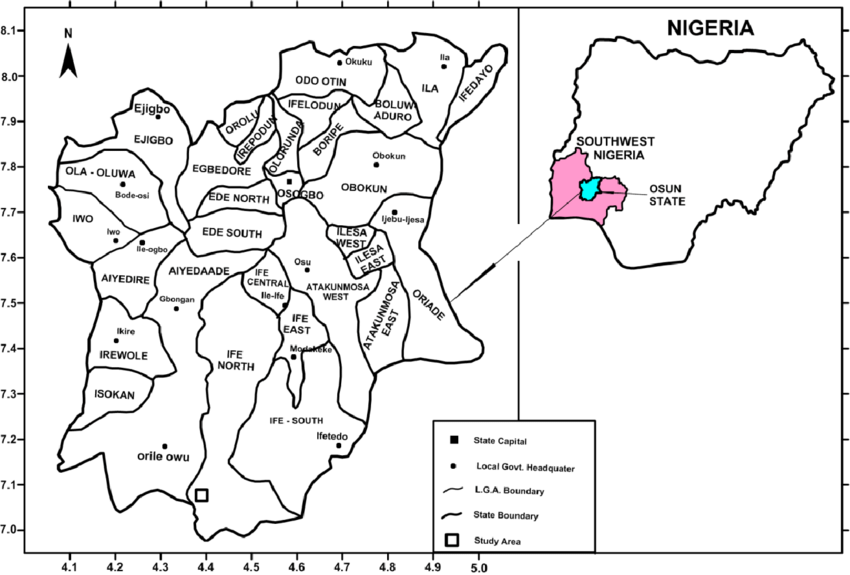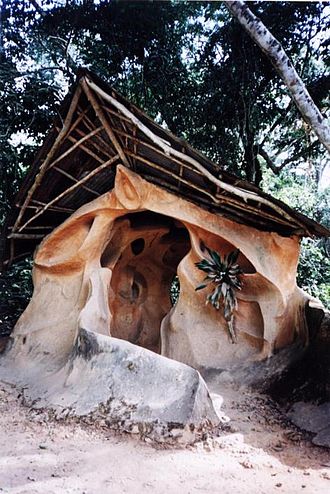Total
Area
People in
the town
Elevation
Welcome to Ìpínlẹ̀ Ọ̀ṣun
We are a state in southwestern Nigeria; bounded to the east by Ekiti and Ondo states, to the north by Kwara State, to the south by Ogun State and to the west by Oyo State. Named for the River Osun—a vital river which flows through the state—the state was formed from the southeast of Oyo State on 27 August 1991 and has its capital as the city of Osogbo.
Of the 36 states of Nigeria, Osun is the ninth smallest in area and nineteenth most populous with an estimated population of about 4.7 million as of 2016. Geographically, the state is divided between the Nigerian lowland forests in most of the state and the drier Guinean forest–savanna mosaic in the north. The major geographical features are rivers including the state’s namesake, the River Osun which bisects the state’s interior before forming much of the state’s southwestern border with Oyo State and flowing south. Other important rivers are the Erinle and Oba rivers, both Osun tributaries which flow from the north before meeting the Osun along the southwestern border. Among the state’s fauna are mona monkey, common kestrel, purple heron, and royal antelope, along with some of Nigeria’s last remaining Nigeria-Cameroon chimpanzee and African forest elephant which inhabit the heavily threatened forests along the southern borders with Ondo and Ogun states.
The name ‘’Osun’’ comes from a river that flows through the state. It is symbolic because it serves both spiritual and tourist purposes in the state. The river is worshipped annually by devotees. It is also a tourist spot as people from different parts of the country visit the Osun Groove in Osogbo. The river also provides water for irrigation for the agriculturally rich state.

Mission
Vision
Developmental Plan
- To rally resources for robust socio-economic development so as to position Osun as an exemplary model of pragmatic governance for our people, country and the world.
- To diversify the Osun economy by building platforms and partnerships, to establish the State as a hub for enterprise, trade and commerce for southwestern Nigeria.
Freedom for all, life more abundant’
The State seeks to rally all available resources human, business and natural to execute a robust socio-economic development agenda. The State consciously pursues both social and economic programs in an integrated manner because of its resolve to use human capital as the primary agent of change for its development programmes. It therefore becomes imperative that human capacity be developed and nurtured to sustainably propel our economic and infrastructure programs.
Towards this approach to governance, the administration seeks to run a more pragmatic governance model to tackle the modern day challenges of our people and country. As our country, Nigeria currently relies considerably on food imports, spending more than $6 billion; the State therefore seeks to reengineer her economy in such a way as to concisely tap into the huge food market in the country.
Therefore, Agri-Business development constitutes a core focus of the State’s economic development plan. The State is building and seeking more partnerships to develop human, physical and business infrastructure to foster agri-business. Specifically, the State seeks to diversify the current economy by serving 10% of the over three billion Naira ($20 million) per month food market in Lagos – the largest market in western Africa.
The State, then seeks through its ambitious OREAP (Osun Rural Enterprise and Agriculture Programme) and OHUB (Osun Hub Programme) to position Osun as a commercial hub to link the hinterland of Nigeria with Lagos – the country’s largest food market. In achieving this, the State is investing as well as seeking partnerships to build a dedicated logistics system to seamlessly warehouse and transport goods between Lagos and Osun through its OHUB program.
The State is also investing in and seeking partnerships with the private sector to build infrastructure (physical and human) to develop the requisite capacity that will drive the hub ambitions of the State. To achieve this vision, with full trust in GOD, A six-point plan was outlined by the current administration. The Government has been implementing its programs and initiatives in line with this plan.

Culture in Ọ̀ṣun
Every year, adherents and non-adherents of Osun, one of the Orisa (the traditional deities of the Yoruba people), travel from all over the world to attend the annual Osun-Osogbo festival in August. Visitors include nationals of Brazil, Cuba, Trinidad, Grenada, and other nations in the Americas with a significant Yoruba cultural heritage. Annual traditional festivities and invocations of the Osun goddess are held along the banks of the river bearing her name into which – according to Yoruba Oratory traditions – she transformed.
Ọsun-Ọsogbo Grove, the shrine of the annual rites of the deity and an important artistic center, was declared a World Heritage Site in 2005.
Our History in Osun State
Yoruba tradition has it that Ile-Ife in the State of Osun is where Olodumare started the creation of the world. It represents the beginning of life, the birthplace of civilization, the embodiment of all that we see or feel. Osun is the ancestral home of the Yoruba Race whether home or abroad. It is the central and most important location of this morally rich, culturally sound and highly sophisticated race in the world. It represents the spiritual, the physical and the technological.
Vision is the pathway and the guiding light into the future. This was what the founding fathers and agitators for the creation of a state to be named ‘’ Osun ‘’ had in mind and did everything possible to realize the vision. They weathered opposition and confronted obstacles for the generation past, present and unborn.
The struggle for the creation of Osun started as early as 1950. At that time, the present senatorial districts namely Osun West, Central and part of Osun East were subordinate towns under the administration of Ibadan District Native Authority but in there determination to get independence, traditional rulers and citizens of Osun Area submitted a petition to the British Colonial Administration in Nigeria demanding autonomy for Osun Division, with Osogbo proposed as the headquarters
Administrations in Osun
Ademola Jackson Nurudeen Adeleke
On November 27, 2022, was sworn in as the state’s sixth governor. Adeleke ran against former governor Gboyega Oyetola in the gubernatorial election on July 16, 2022. Adeleke defeated Gboyega Oyetola by a vote of 402,979 to 375,077. Adeleke won in 17 LGAs, including Olorunda, Ede South, Orolu, Osogbo, Odo Otin, Ifelodun, Boluwaduro, Atakumosa, and Ila. Ademola Jackson Nurudeen Adeleke is the state’s current governor.
Gboyega Oyetola
A politician, he was the fourth executive governor of Osun State under the Fourth Republic. He was elected on the platform of the APC. He was known for his continuity with the policies of his predecessor, Rauf Aregbesola.
Rauf Aregbesola
A politician, he was the third executive governor of Osun State under the Fourth Republic. He was elected on the platform of the All Progressives Congress (APC). He was known for his educational reforms and his commitment to social welfare.
Olagunsoye Oyinlola
A lawyer and politician, he was the second executive governor of Osun State under the Fourth Republic. He was elected on the platform of the People's Democratic Party (PDP). He was known for his infrastructural development projects and his commitment to agriculture.
Bisi Akande
A politician, he was the first executive governor of Osun State under the Fourth Republic. He was elected on the platform of the Alliance for Democracy (AD). He was known for his pro-poor policies and his commitment to education.
Theophilus Bamgboye
A military officer, he was the fourth administrator of Osun State. He was appointed by the military government of General Abdulsalami Abubakar. He was responsible for overseeing the transition to civilian rule in Osun State.
Anthony Obi
A military officer, he was the third administrator of Osun State. He was appointed by the military government of General Sani Abacha. He was responsible for overseeing the transition to civilian rule in Osun State.
Anthony Udofia
A military officer, he was the second administrator of Osun State. He was appointed by the military government of General Sani Abacha. He was responsible for overseeing the transition to civilian rule in Osun State.
Isiaka Adeleke
A businessman and politician, he was the first civilian governor of Osun State. He was elected on the platform of the Social Democratic Party (SDP). He was removed from office by the military government of General Sani Abacha in November 1993
Leo Segun Ajiborisha
A military officer, he was the first administrator of Osun State. He was appointed by the military government of General Ibrahim Babangida. He was responsible for overseeing the transition to civilian rule in Osun State.

